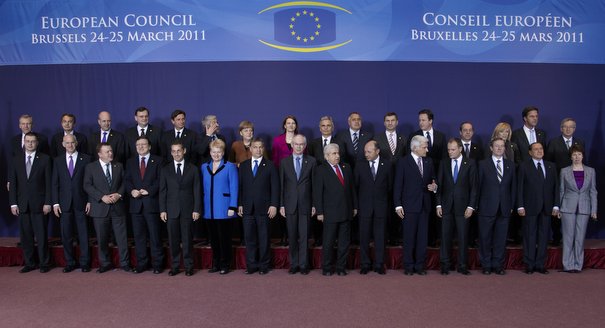Twenty years after the Treaty of Maastricht created the Common Foreign and Security Policy (CFSP), do Europeans really understand the danger of marginalization they face on the international stage today? The euphoric period following the fall of the Soviet Union, when it seemed obvious that the world would Westernize and politics would become more democratic and economies more liberal, is behind us, despite the Arab Spring. In that era the European Union’s enlargement strategy, which reached its pinnacle with the addition of ten new member states in 2004, was a formidable instrument of foreign policy in the EU’s near neighborhood.
Today the CFSP looks toothless when faced with the difficulties of new rounds of enlargement and delays in developing alternative and complementary policies. We are constantly reminded of how out of touch Maastricht’s initial aims were with the means the treaty deployed. Jacques Delors’s warning in 1992—“let’s not talk of a single foreign policy—the objective is out of reach—but rather of the possibility of joint actions in foreign policy”—has become more relevant than ever.
In late 2011 the verdict looks all the more harsh given that the emerging trends of the first decade of the twenty-first century—the rise of new powers and the simultaneous decline of American capacity and influence under the strain of interventions in Iraq and Afghanistan—have been transformed by the financial crisis and Western public debt concerns into a full-scale upheaval of the relationship between emerging countries and the West. It is already clear that this economic crisis will last longer for Westerners, even if it is not yet clear how much it will reduce Europe’s international capacities and influence.
To limit this loss of influence the EU needs to be more effective, concentrating on a small number of priorities and making better use of the main instruments at its disposal. The innovations of the Lisbon Treaty—in particular the European External Action Service—are useful additional tools that will take time to bear fruit. However, they must not lead the Union to lapse again into an obsession over an elusive CFSP. The EU would do better to concentrate on external interventions related to targeted priorities, supported by a sufficient number of member states and proportionate with available means.
The EU is above all a unique model of regional integration, with an integrated trade policy and an unparalleled internal market. It therefore has a major advantage in international trade negotiations, which should particularly allow it to introduce more conditionality in its bilateral relations.
Using its internal market and its competition policy, the EU must maintain its world-class capacity to produce the standards and principles needed in the domain of international trade and competition. If used well, the Union’s capacity as a standard-setter can make it a leading actor in the creation of the new regulations which globalization makes necessary, an area where emerging economies remain hesitant and divided.
In addition, Europe’s policies and institutions are still a model of sovereignty-sharing and economic solidarity between rich and poor—one which could prove useful inspiration for the new modes of international and regional governance made necessary by the political, economic, environmental, and other challenges and crises of the twenty-first century global order.
EU enlargement, which helps give concrete form to the elusive CFSP, can still be beneficial and therefore should be pursued, particularly in the Balkans. The Arab Spring provides an historic opportunity to strengthen another “pillar” of EU external action—the “neighbourhood policy.”
Here it would be absurd to return to the sterile debate over competition between south and east: the EU and its member states must show moral support and material aid to build prosperity and the rule of law throughout the entirety of their neighborhood. It is in the EU’s vital interest to base its relations with all neighbors on interdependence and shared values, and as such to build a veritable pole of influence at the global level.
This entails developing better relations with Turkey—independently from accession negotiations—by closely associating the country with the neighborhood policy and by developing joint policies on a broad range of issues. It also means making progress towards a stable and constructive partnership with Russia, the great neighbor that cannot be ignored.
To meet the challenge of increasing dependence on foreign energy supplies, the EU must put solidarity at the heart of a new common energy policy. That means that the Union and its member states must speak and act in unison, both with a view to extending the energy market beyond Europe’s borders and during discussions with foreign suppliers.
It is also important to calmly discuss the issue of migration between European nations with aging populations and much younger foreign countries, whether they are neighbors or not. In the former, foreign labor is more of a solution than a problem. In the latter, while the majority of the population will find work at home, some people still wish to come to the EU. Upcoming discussions on harmonizing national asylum policies will be a first test in this area.
The conflict in Libya offers many lessons—it was a reminder of the need for more active engagement from all European countries, in particular Germany; it showed once again the importance of transatlantic cooperation, despite the stepped-back approach of the United States; and it confirmed the need for coherent and coordinated European military spending, particularly in the context of constrained public expenses.
If the EU is to consolidate the handful of policies mentioned above, it needs more than ever to be able to count on convergence between the positions of its member states. In areas where differentiated progress is possible—in particular in military matters—it is probably best either to pursue ad-hoc cooperation or to use the tools of enhanced cooperation and “Permanent Structured Cooperation” provided by the Lisbon Treaty. The fact that some ambitious member states take the lead in certain areas does not mean that these actions are not developed for the benefit of all the EU. Above all, in an inexorably shrinking Europe it is essential to ask whether it is time to accept a fundamental truth: that international strength comes only through union, and that we need to think global and act European. The alternative is to try to swim alone, in seas which have become too vast and turbulent for our individual states.
Sami Andoura and Elvire Fabry are senior research fellows at Notre Europe, the Paris-based European think tank created by Jacques Delors.
To reinvigorate debate over European foreign policy and Europe’s role in the world, Carnegie Europe is publishing a series of essays from leading policymakers, diplomats, experts, and journalists on Strategic Europe over the coming weeks. A new essay will appear every day.












